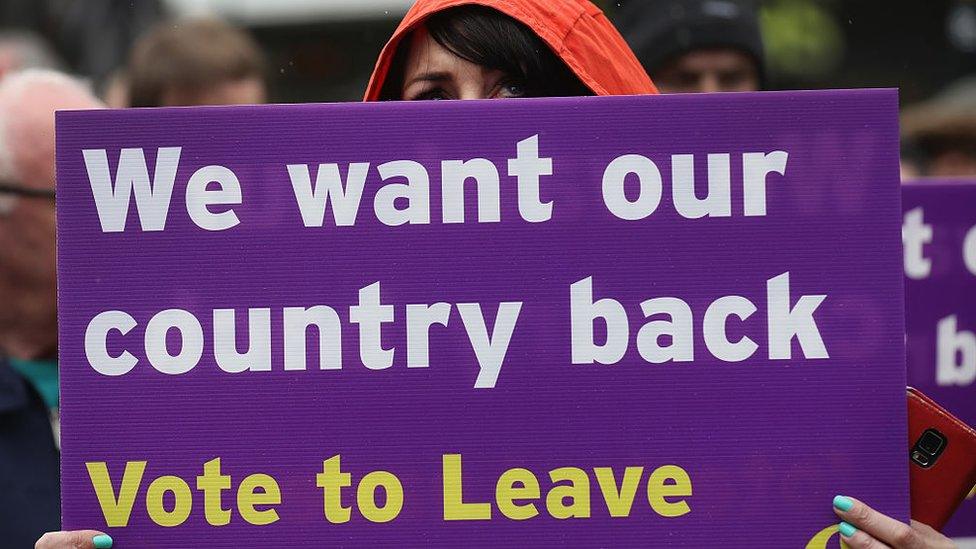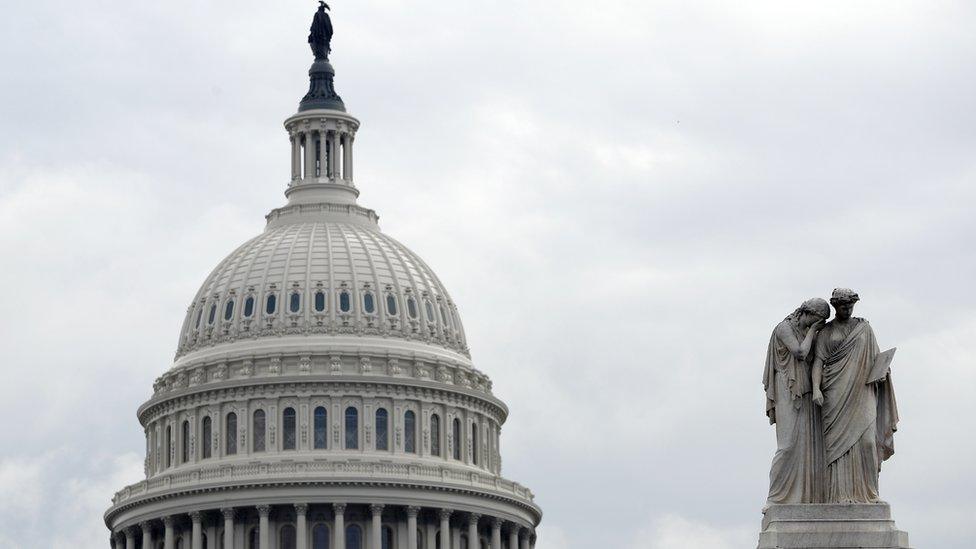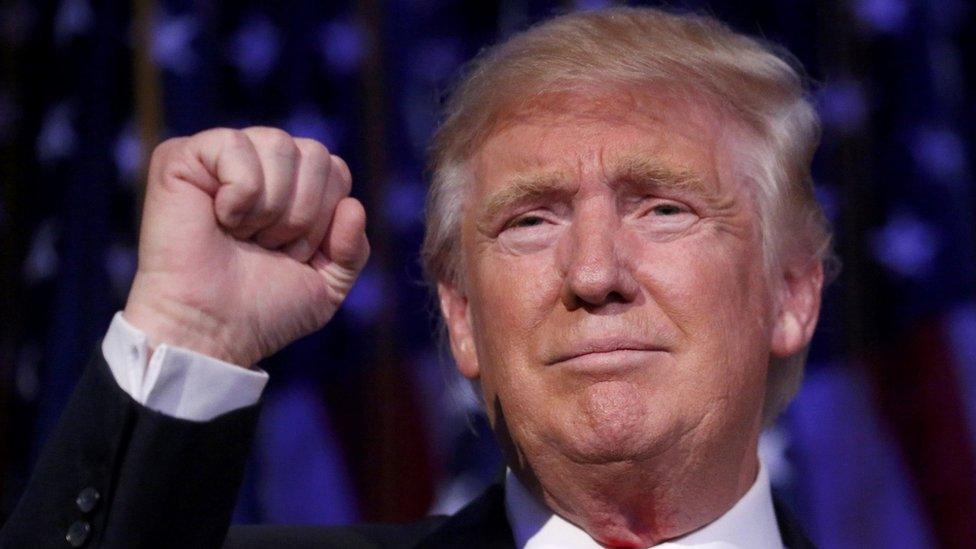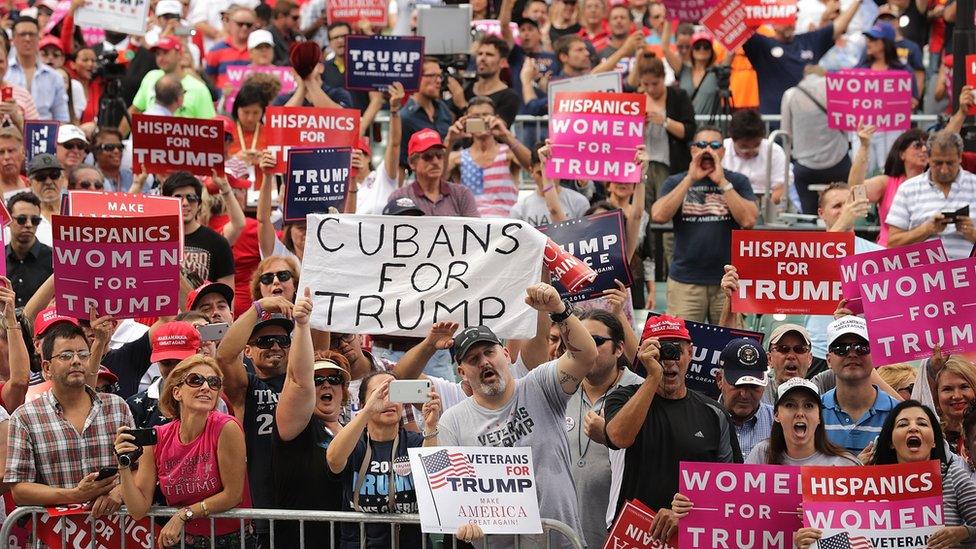What links Trump's victory and Brexit?
- Published
- comments
Nigel Farage campaigned for Donald Trump
"It'll be Brexit plus plus plus!" said Donald Trump. It was. If Brexit felt like a political earthquake, the election of this populist president was off the seismic scale, the continental plates shifting underneath the country which has defined our modern world.
Obama had that poster - "Hope" in cool colours. Trump paints in brasher, bolder strokes. His triumph is a release of pent-up anger but it is still about that same yearning for a change.
Make no mistake. This victory, like Brexit, gives a new hope for a better future to those who backed it - and their aspirations and expectations will be sky high.
Both left the political establishment, not to mention the pollsters, reeling in shock.
I am glad on this occasion I had been telling everyone who'd listen, that after last June's Brexit shock and the UK General Election's surprise I just didn't trust the polls. After all if people were "shy" of admitting they backed David Cameron how much more bashful would they feel in declaring for Trump?
My gut feeling was that he would win. In my five years in the US I'd seen the frustration and fury mounting.
It is perhaps ironic that our two countries, with a reputation for stable political systems, have delivered political revolutions of such importance. Or perhaps it's not. Perhaps their stability and strength is they can cope with popular revolts, without pitchforks or getting blood all over our sans culottes.
The wave of populism all over the West has already delivered a very right-wing government in Hungary, and a very left-wing one in Greece.
'I will be president for all Americans'
For years there has been a mounting mood, a disconnect between politicians and people which finds expression in a search for politics outside the old norms. Those of us who've been urging people to pay attention to these movements shouldn't now gloat about our foresight but ask hard questions about the political response, from left, right and centre.
There's no doubt the election of the 45th president and Brexit have similar roots. But word of caution for both sides of the Atlantic - voters are individuals, and this is a mood, not a party programme.
As Trump put it, not a campaign but "a great movement". People who voted for either revolution may share some of the concerns outlined below, but not others. Indeed, if there was a simple root cause it wouldn't be so powerful.
Be cautious about the theory this is all about the "left behinds" - older, poorly-educated white workers disposed by globalisation, the children and grandchildren of the rust belt.
It is not wrong, but it is not sufficient. Those whose jobs have gone to Mexico and China, those who did well-paid jobs undercut by immigration, are indeed of a mood against neoliberalism and globalisation.

Trump supporters and pro-Brexit campaigners used similar rhetoric
But that is a simple story about the economy that doesn't quite do justice to the complexity of the last 30 years. In today's economy many more than just the disposed working class feel left out. The gap between the very rich and the rest widens, bills and insecurity pile up, but neither their prospects nor the economy grows apace.
It isn't getting any better.
Few politicians dare tell them that increased automation may take more jobs than immigrants. You can't deport a driverless truck. Nevertheless, the fears of the economic and cultural effects of immigration looms very large.
Behind it lurk worries about an insecurity about identity. While some feel at home in Beijing, Berlin or Birmingham, others no longer feel at home in their home.
I'll be interested to see if the detailed breakdown proves me wrong but, let's face it, it doesn't seem to be economically insecure black or Hispanic voters who backed The Donald.
If the UK has very similar concerns there is an added component in the US. Either because of its history of civil war and slavery, there's little doubt race is a critical factor - some whites feel that America is no longer their property - because it isn't.
Another difference. In the US the evangelical Christian right, very concerned about abortion and changing sexual morality, is a force we don't have in the UK.

Many US voters dislike the Washington political elite
But in both countries distaste for the liberal elite goes hand in hand with a despair at a government that is seemingly unresponsive and out of touch. This is very much stronger in the States than here, when Washington is almost a swear word, where a gridlocked Congress has frozen most attempts to get things done.
The American system was designed to be slow, and block change unless it is consensual (itself arguably a legacy of slavery). But that system feels broken, dysfunctional, almost beyond repair.
And here's my own hobby horse - while American elections are ideal reality TV, the nuts and bolts of democratic politics can seem almost quaint in an internet age of huge choice.
When we can change our mortgage or our energy company at the click of a mouse, voting for one of two bundles of policies every four or five years seems curiously sluggish.
I wrote last week that if Donald Trump was seen as a huckster, a snake-oil salesman, it was worth remembering that people bought that patent medicine because every other remedy had failed.
As one European central banker said recently, people sway the bridge because it no longer seems a way of crossing the river.
The volume of articles peering behind the populism will grow. But we need people who change the world, rather than describe it.

Mr Trump successfully marketed his own brand of charisma and populism
We need to hear coherently and urgently from those on every side of the debate. Those who support globalisation and immigration need to step up to the plate and be more specific about the benefits of their project.
Those, like Theresa May, who seem to accept part of the populist message must be urged to spell out how they square the circle of a linked world economy of free trade with answering concerns about industrial policy and identity.
And, of course, those who caustically and brilliantly articulate the concerns need to develop solutions.
The president-elect has a few months to work out how to turn a howl of anguish into effective policy. No doubt along with a few good soundbites. From anguish to hope to relief is a long journey.
Some members of the US establishment argue that Donald Trump can be contained or that, having achieved his aim, the brutal rhetoric will be ditched, he won't really build a wall, ban Muslims, deport millions of illegal immigrants or make the Middle Eastern desert glow.
That may be so. He will be a hero for a good while and the outrage of liberals, combined with his brutalist charisma, will be a bulwark against criticism from his own side, for a while.
But he must be aware the hard right cherish myths of betrayal and it will, after a while, swoop like a hawk on any backsliding.

Trump's challenge is to deliver the promises made to his supporters
There is a deeper danger. At the heart of his presidency will be how he deals with immigration and the economy.
Anyone who has travelled America's roads and rails and used its airports will understand Trump's call for massive investment in infrastructure. Such a Keynesian stimulus would provide "shovel ready" jobs for the dispossessed.
But it is hard to see where the cash would come from, if he is curbing Americans' overspending, and drastically cutting taxation.
Similarly, there could be strains in the Trump coalition between those who want a radically smaller government and one that sticks its oar into big companies and banks.
The biggest questions will be about his character and control. But his supporters may relish the occasional outburst. But the real lesson of this election is the breadth and depth of his ambition.
Remember, in reality Obama was very cautious and promised very little. Trump has promised the moon by comparison.
If he delivers it he will be a transformative figure who we have all underestimated. If he fails, there will still be millions of angry, disillusioned Americans still searching for hope.